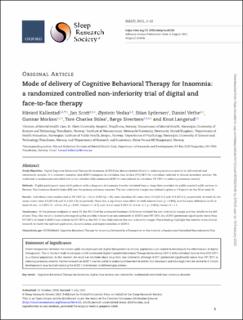Mode of delivery of Cognitive Behavioral Therapy for Insomnia: a randomized controlled non-inferiority trial of digital and face-to-face therapy
Kallestad, Håvard; Scott, Janine Linda; Vedaa, Øystein; Lydersen, Stian; Vethe, Daniel; Morken, Gunnar; Stiles, Tore C; Sivertsen, Børge; Langsrud, Knut
Peer reviewed, Journal article
Published version

Åpne
Permanent lenke
https://hdl.handle.net/11250/2979408Utgivelsesdato
2021Metadata
Vis full innførselSamlinger
- Institutt for psykisk helse [1197]
- Publikasjoner fra CRIStin - NTNU [37186]
- Publikasjoner fra Cristin - St. Olavs hospital [1458]
- St. Olavs hospital [2440]
Sammendrag
Study Objectives
Digital Cognitive Behavioral Therapy for Insomnia (dCBT-I) has demonstrated efficacy in reducing insomnia severity in self-referred and community samples. It is unknown, however, how dCBT-I compares to individual face-to-face (FtF) CBT-I for individuals referred to clinical secondary services. We undertook a randomized controlled trial to test whether fully automated dCBT-I is non-inferior to individual FtF CBT-I in reducing insomnia severity.
Methods
Eligible participants were adult patients with a diagnosis of insomnia disorder recruited from a sleep clinic provided via public mental health services in Norway. The Insomnia Severity Index (ISI) was the primary outcome measure. The non-inferiority margin was defined a priori as 2.0 points on the ISI at week 33.
Results
Individuals were randomized to FtF CBT-I (n = 52) or dCBT-I (n = 49); mean baseline ISI scores were 18.4 (SD 3.7) and 19.4 (SD 4.1), respectively. At week 33, the mean scores were 8.9 (SD 6.0) and 12.3 (SD 6.9), respectively. There was a significant time effect for both interventions (p < 0.001); and the mean difference in ISI at week 33 was −2.8 (95% CI: −4.8 to −0.8; p = 0.007, Cohen’s d = 0.7), and −4.6 at week 9 (95% CI −6.6 to −2.7; p < 0.001), Cohen’s d = 1.2.
Conclusions
At the primary endpoint at week 33, the 95% CI of the estimated treatment difference included the non-inferiority margin and was wholly to the left of zero. Thus, this result is inconclusive regarding the possible inferiority or non-inferiority of dCBT-I over FtF CBT-I, but dCBT-I performed significantly worse than FtF CBT-I. At week 9, dCBT-I was inferior to FtF CBT-I as the 95% CI was fully outside the non-inferiority margin. These findings highlight the need for more clinical research to clarify the optimal application, dissemination, and implementation of dCBT-I.
Clinicaltrials.gov: NCT02044263: Cognitive Behavioral Therapy for Insomnia Delivered by a Therapist or on the Internet: a Randomized Controlled Non-inferiority Trial.
